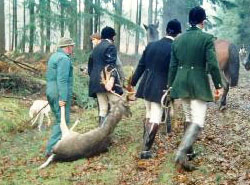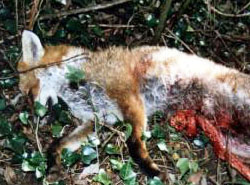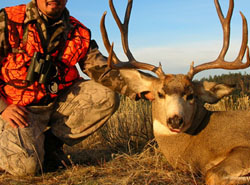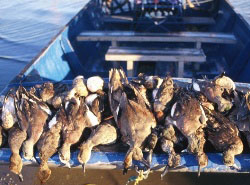- Animal Testing
- Beef
- Chicken
- Circuses
- Dairy
- Dissection
- Donkeys
- Down
- Eggs
- Foie Gras
- Fur
- Honey
- Hunting
- Lobster
- Pork
- Seal Hunt
- Turkey
- Wool
- Zoos
Hunting

Unlike 10,000 years ago, today the vast majority of hunters does not need to hunt in order to survive. Most hunters hunt just for fun.
Hunters spend billions of dollars each years on guns, ammunition, travel and other expenses, making hunting a very profitable industry.

Managing Wildlife
Unlike what some people might believe, hunting is not an effective method to manage and conserve wildlife. When left alone, nature is very capable of keeping a good balance. Natural predators kill of the sickest and weakest animals. And in cases of overpopulation, starvation and disease are nature's (unfortunate) way of removing the weakest and bringing back a good balance.

Hunters don't try to kill only the weaker animals. They often kill the strongest and healthiest animals. They prefer the bucks with the largest rack. The weaker and genetically inferior bucks are left to propagate the species, weakening the overall health of the herd. Killing of a large number of mature males also creates a disproportionate ratio of females to males, impacting the social structure of a herd.

Wounded Animals
A very large number of animals are wounded, but not killed by hunters. These animals have to suffer prolonged and painful deaths.
Numerous research studies, both in the U.S. and Canada, estimate a wounding rate of more than 30% of ducks and geese. Which means that between 3.4 and 3.7 million ducks and geese go unretrieved each year in the U.S. and Canada combined.
One especially cruel hunting method is bowhunting. A Maryland study based on reports submitted by bowhunters from 1989-2006, estimates that 18% of deer were not recovered.

